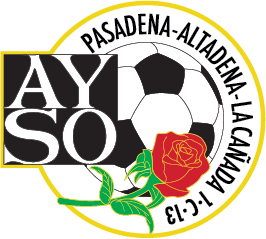AYSO philosophies
 These 6 philosophies guide the organization to deliver a positive, fun, fair, and safe soccer experience that enriches childrens’ lives.
These 6 philosophies guide the organization to deliver a positive, fun, fair, and safe soccer experience that enriches childrens’ lives.
Everybody Plays®
AYSO’s goal is for people to play soccer, so we mandate that every player on every team must play at least 50 percent of every game.
Balanced Teams
Each year we form new teams as evenly balanced as possible, providing a stronger learning experience for teams as they play teams comprised of similar ability. It also allows for each player to experience playing with a wide variety of teammates of different skill levels.
Open Registration
If you want to play soccer, AYSO welcomes you and gives all youth and adults the opportunity to register and play.
Positive Coaching
A coach can be one of the most influential people in a player’s life, so AYSO requires they create a positive experience for every player in AYSO. Additionally, encouraging player’s effort leads to greater enjoyment, improved skills and stronger motivation in players.
Good Sportsmanship
We strive to create a positive environment based on mutual respect rather than a win-at-all-costs attitude, and our programs are designed to instill good sportsmanship in every facet of AYSO.
Player Development
All players should be able to develop their soccer skills and knowledge to the best of their abilities, both individually and as members of a team, to maximize their enjoyment of the game.
Childrens’ rights in sport
Region 13 recognizes the Project Play Children’s rights in sport;
- To play sports.
Organizations should make every effort to accommodate children’s interests to participate, and to help them play with peers from diverse backgrounds.
Region 13 removes financial obstacles by awarding scholarships to anyone who needs them. In 2021, over $20,000 in scholarships were awarded for the fall league.. - To safe and healthy environments.
Children have the right to play in settings free from all forms of abuse (physical, emotional, sexual), hazing, violence, and neglect.
AYSO trains all volunteers through SafeSport in recognizing and preventing abuse. - To qualified program leaders.
Children have the right to play under the care of coaches and other adults who pass background checks and are trained in key competencies.
AYSO has the nation’s best training for coaches and referees.
Region 13 provides additional mentoring for coaches and referees on an ongoing basis during the fall league. - To developmentally appropriate play.
Children have a right to play at a level commensurate with their physical, mental and emotional maturity, and their emerging athletic ability. They should be treated as young people first, athletes second.
Region 13 progressively increase - To share in the planning and delivery of their activities.
Children have the right to share their viewpoints with coaches and for their insights to be incorporated into activities.
Region 13 uses the best practices from https://www.keepgirlsinsport.com/ to involve players in the operation of their teams.
Region 13 offers a progression of programs, from introductory to very competitive. some players may feel they are overqualified for the fall league teams; this should be an opportunity to develop leadership skills that will pay off in the more competitive winter and spring programs. - To an equal opportunity for personal growth.
Programs should invest equally in all child athletes, free of discrimination based on any personal or family characteristic.
Region 13 has a formal diversity, equity, and inclusion program to proactively improve child experiences in all its programs. - To be treated with dignity.
Children have the right to participate in environments that promote the values of sportsmanship, of respect for opponents, officials, and the game.
Region 13 has formal processes for monitoring the sporting behavior, and delivering mentoring where needed to promote good sporting behavior. - To enjoy themselves.
Children have the right to participate in activities they consider fun, and which foster the development of friendships and social bonds.
